Module 9 Life history Unit 3 Language in use课件40张
文档属性
| 名称 | Module 9 Life history Unit 3 Language in use课件40张 | 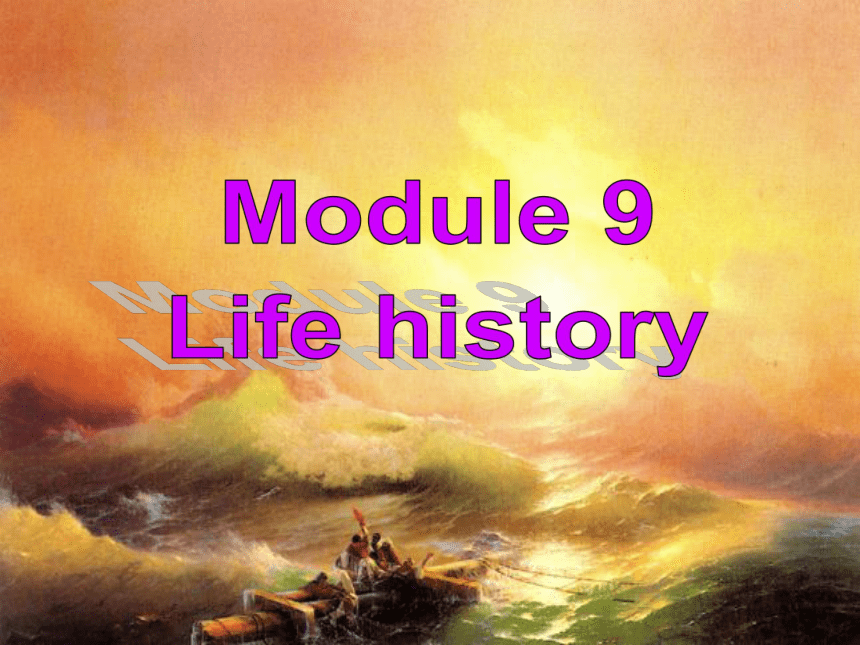 | |
| 格式 | zip | ||
| 文件大小 | 2.0MB | ||
| 资源类型 | 教案 | ||
| 版本资源 | 外研版 | ||
| 科目 | 英语 | ||
| 更新时间 | 2019-03-25 19:58:35 | ||
图片预览

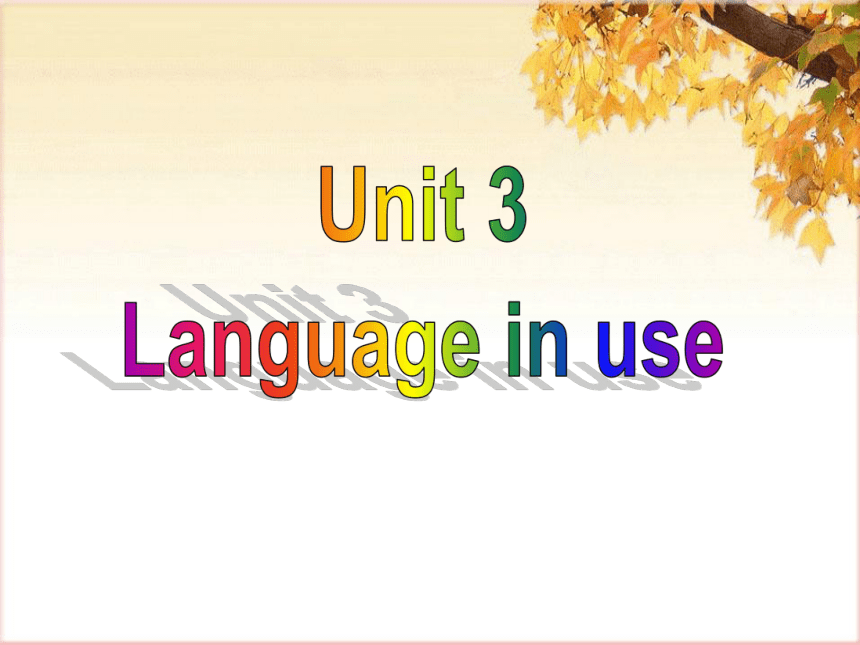
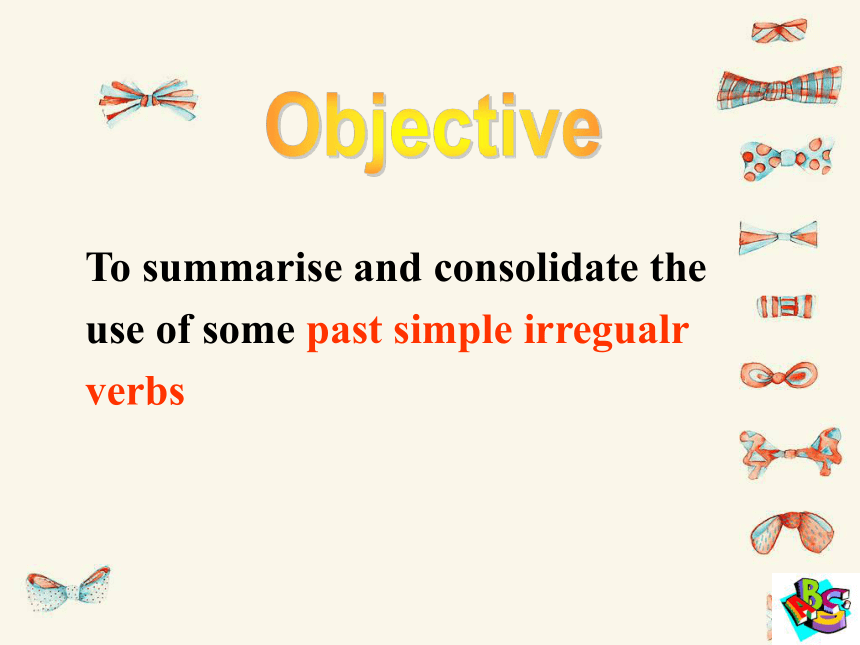

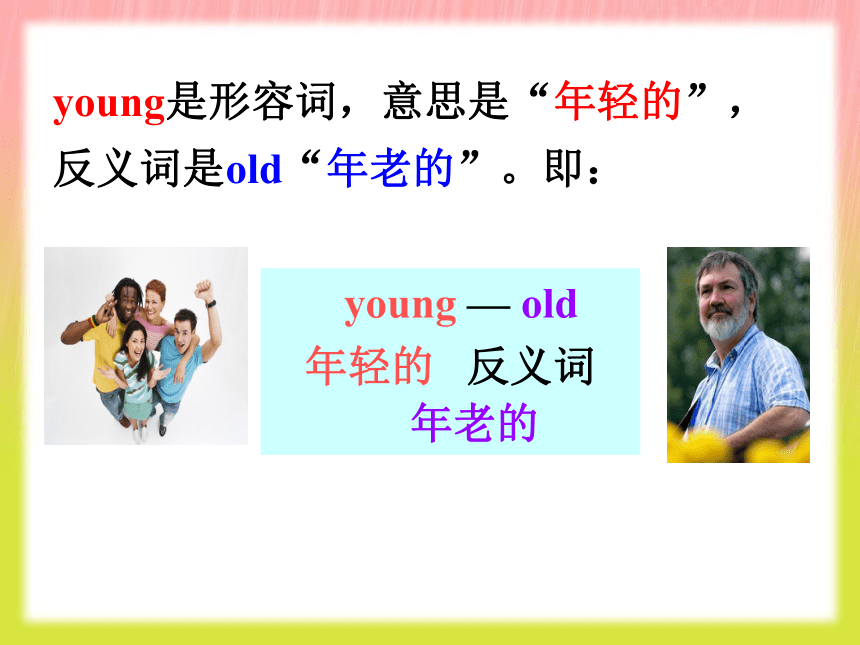
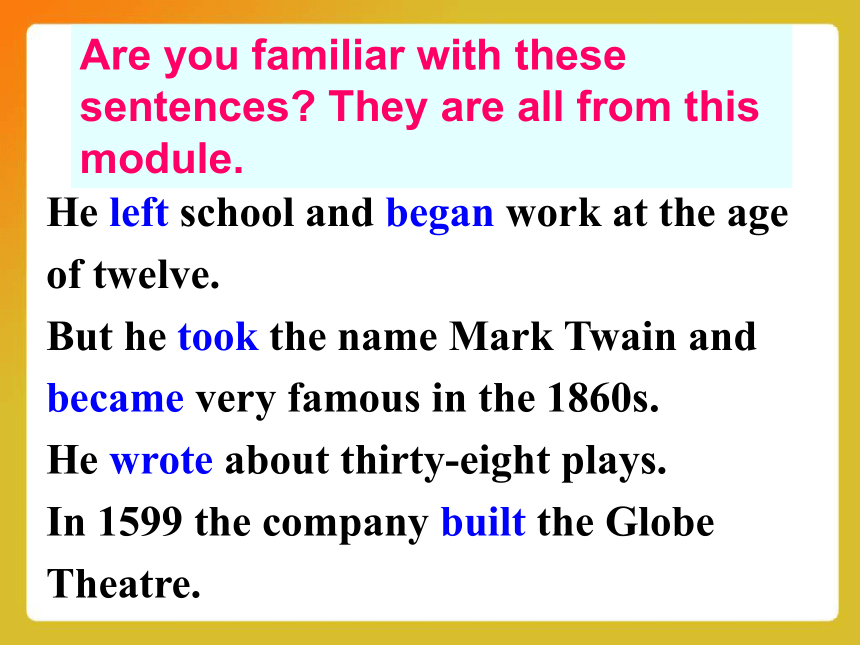
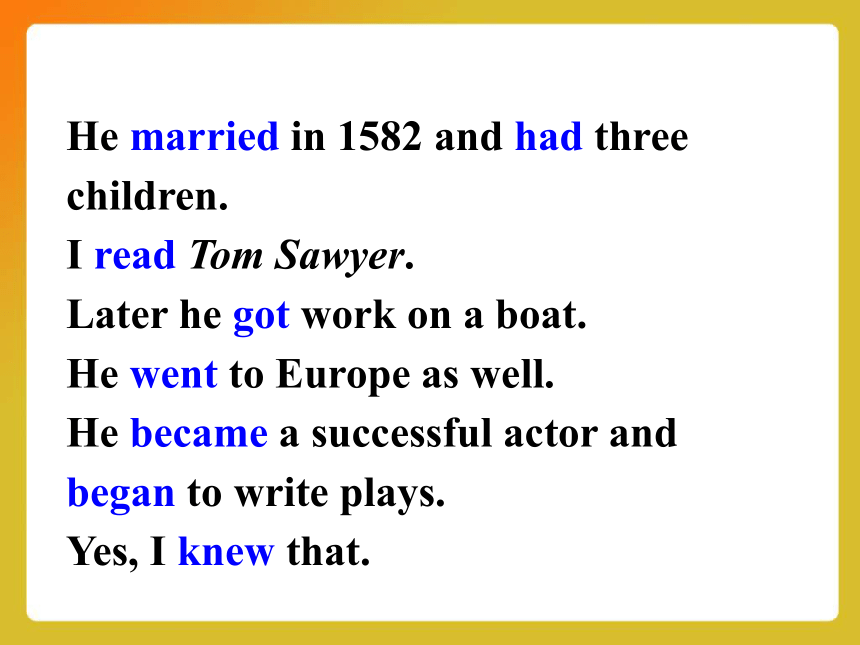
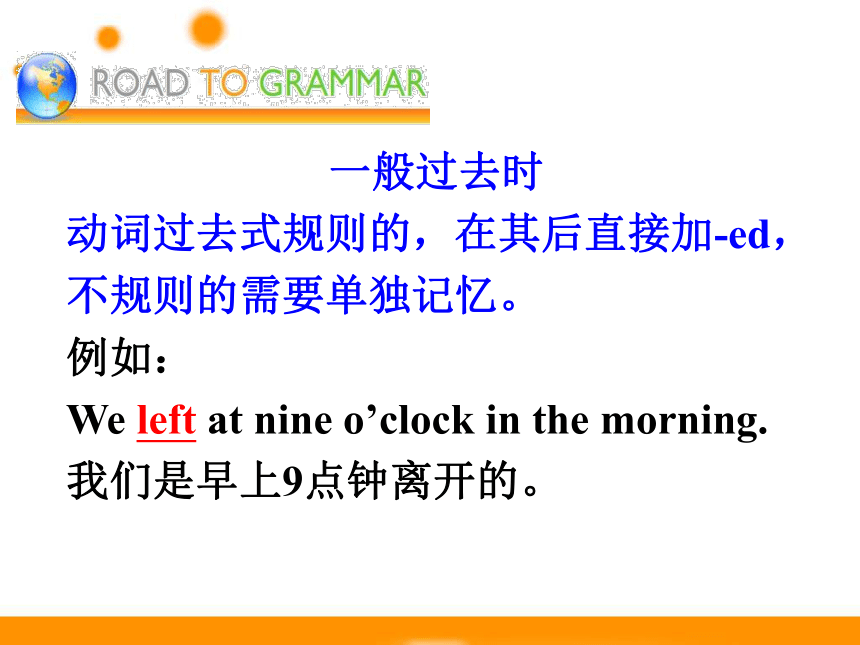
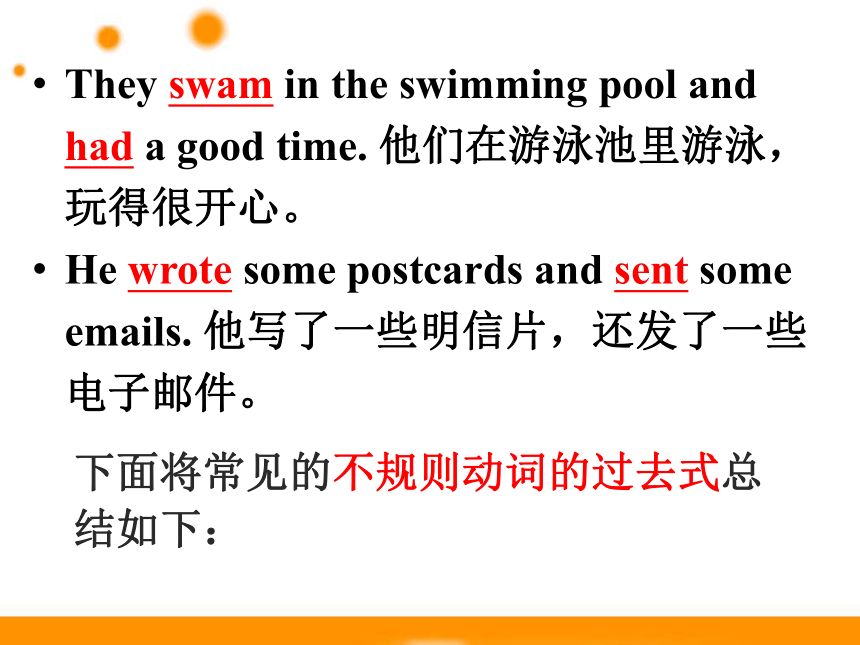
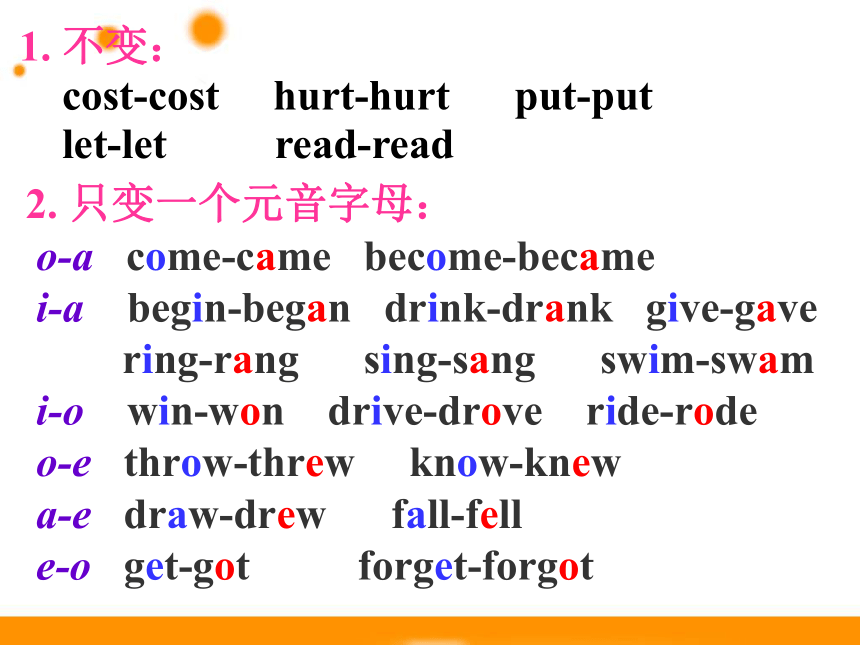
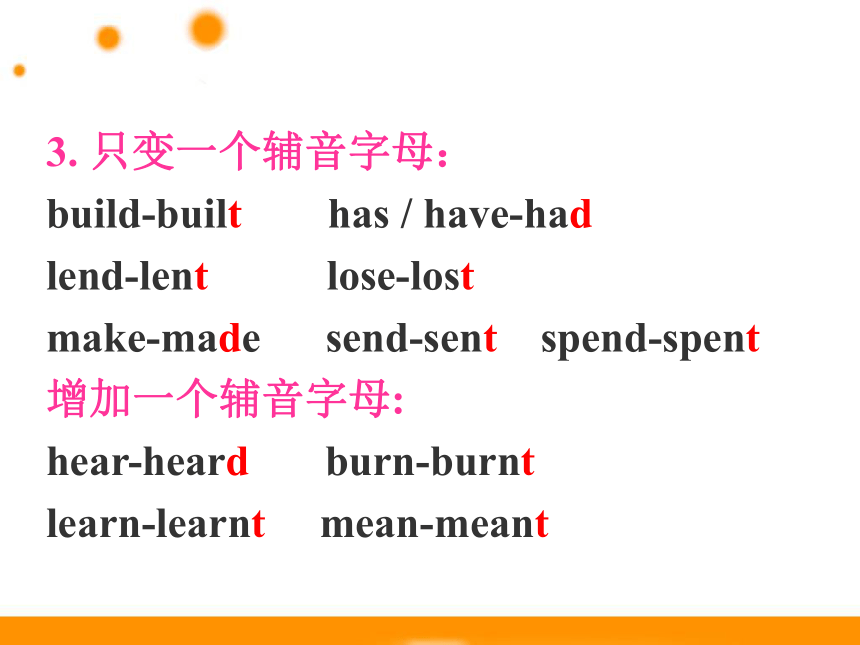
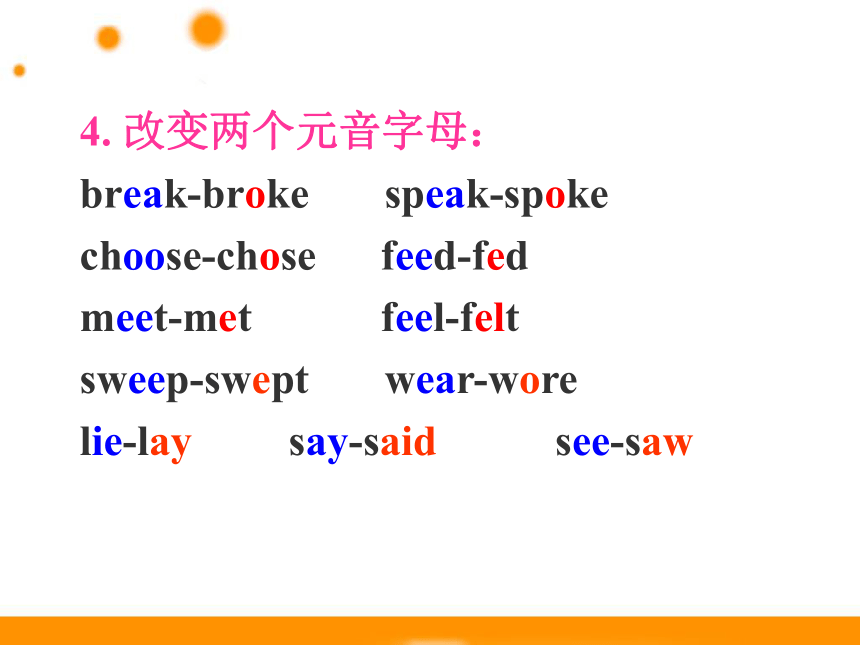
文档简介
To summarise and consolidate the use of some past simple irregualr verbs
young adj. 年轻的
young是形容词,意思是“年轻的”,反义词是old“年老的”。即:
young — old
年轻的 反义词 年老的
He left school and began work at the age of twelve.
But he took the name Mark Twain and became very famous in the 1860s.
He wrote about thirty-eight plays.
In 1599 the company built the Globe Theatre.
Are you familiar with these sentences? They are all from this module.
He married in 1582 and had three children.
I read Tom Sawyer.
Later he got work on a boat.
He went to Europe as well.
He became a successful actor and began to write plays.
Yes, I knew that.
一般过去时
动词过去式规则的,在其后直接加-ed,不规则的需要单独记忆。
例如:
We left at nine o’clock in the morning.
我们是早上9点钟离开的。
They swam in the swimming pool and had a good time. 他们在游泳池里游泳,玩得很开心。
He wrote some postcards and sent some emails. 他写了一些明信片,还发了一些电子邮件。
下面将常见的不规则动词的过去式总结如下:
2. 只变一个元音字母:
o-a come-came become-became
i-a begin-began drink-drank give-gave
ring-rang sing-sang swim-swam
i-o win-won drive-drove ride-rode
o-e throw-threw know-knew
a-e draw-drew fall-fell
e-o get-got forget-forgot
1. 不变:
cost-cost hurt-hurt put-put
let-let read-read
3. 只变一个辅音字母:
build-built has / have-had
lend-lent lose-lost
make-made send-sent spend-spent
增加一个辅音字母:
hear-heard burn-burnt
learn-learnt mean-meant
4. 改变两个元音字母:
break-broke speak-spoke
choose-chose feed-fed
meet-met feel-felt
sweep-swept wear-wore
lie-lay say-said see-saw
5. 过去式含有ought / aught:
buy-bought bring-brought
fight-fought think-thought
catch-caught teach-taught
6. 情态动词:
can-could shall-should
will-would may-might
7. 原形中有-ell:
sell-sold tell-told smell-smelt
8. 其他:
be-was/were do-did find-found
fly-flew go-went leave-left
stand-stood understand-understood
下面是一些常见的不规则动词的过去式。
be — was/were leave — left
buy— bought meet — met
come — came read — read
do — did see — saw
get — got spend— spent
have — had swim — swam
write —wrote take — took
不规则动词的一般过去时的否定形式:
We didn’t leave at nine o’clock in the morning.
我们不是早上9点钟离开的。
They didn’t swim in the swimming pool. They
didn’t have a good time.
他们没在游泳池里游泳。他们玩得不开心。
He didn’t write any postcards and didn’t send
any emails. 他没有写明信片,也没发电子邮
件。(注意:some要变成any!)
一般疑问形式及其肯、否定回答:
Did you leave at nine o’clock in the morning?
你们是早上9点钟离开的吗?
Yes, we did. / No, we didn’t.
是的,我们是。/不,我们不是。
Did they swim in the swimming pool?
他们在游泳池里游泳了吗?
Yes, they did. / No, they didn’t.
是的,他们游了。/不,他们没游。
Did he have a good time? 他玩得开心吗?
Yes, he did. / No, he didn’t.
是的,开心。/ 不,不开心。
Did he write any postcards and send any
emails?
他写了一些明信片, 还发了一些电子邮件
吗?
Yes, he did. / No, he didn’t.
是的,他写了发了。 / 不,他没写没发。
1. Complete the sentences about
Betty’s life.
1. Betty _________ (be born) in Quincy.
2. She _____ (go) to John Adams Primary School.
3. She ______ (be) happy in Quincy.
4. She ______ (have) lots of friends there.
5. She ___________ (come) to China in 2008.
was born
went
was
had
didn’t come
2. Complete the passage with the correct form of the words.
When my father was young, he (1) __________ (not have) much money. He (2) ______ (begin) work at eight o’clock and (3) ____ (leave) at five.
didn’t have
began
left
When he (4) ____ (get) home, he always
(5) _____ (read) a book. In the evening
he (6) _____ (go) to the park and (7)
_____ (have) a good time.
got
read
went
had
3. Complete the conversation with the correct form of the words from the box. You can use the words twice.
begin do get leave
Tony: What time did you (1) _____
school every day when you were a
boy?
Tony’s dad: I (2) _____ at about five
o’clock, I think.
Tony: And what time did you (3) ____
home?
Tony’s dad: Oh, I (4) ___ home about
half an hour after that, at half past five.
leave
left
get
got
begin do get leave
Tony: Did you (5) ___ a lot of
homework?
Tony’s dad: Yes, I (6) _____.
Tony: Did you (7) _______ to play
football when you were at
school?
Tony’s dad: No, I (8) ______ after you
were born.
do
did
begin
began
begin do get leave
4. Complete the passage with correct form of the words from the box.
become go join leave start work
Deng Yaping was born in 1973 in
Zhengzhou, China. She (1) ______
playing table tennis at five. She was only
fifteen when she won her first match for
China. She (2) ________ the National
Team in 1988. Deng won Olympic gold
four times and she (3) _______ famous
all over the world.
joined
became
started
At the age of twenty-four, Deng Yaping
(4) _____ the National Team and
became a student. She (5) _______
very hard. She then (6) _____ to
England and studied there.
left
worked
went
Read the passage, tick true (T) or false (F).
1. Stratford-upon-Avon is famous
because it is the birthplace of
Shakespeare.
2. Stratford is a modern town.
3. You can see Shakespeare’s plays at
the Royal Shakespeare Company
Theatre.
T
F
T
Writing about people in the past
Find out about your parents’ or grandparents’ lives when they were young.
1. Where did you live?
2. What did you often watch?
3. What games did you play?
4. When did you get married?
5. How did you travel?
Now make notes.
Write a timeline.
Write notes on the timeline.
Write a paragraph about their lives.
Write the paragraph.
Do some drawings.
巧记动词过去时态
动词一般过去时, 表示过去发生的事;
be用was或用were, have, has变had;
谓语动词过去式, 过去时间坐标志;
一般动词加-ed, 若是特殊得硬记。
否定句很简单, 主语之后didn’t添;
疑问句也不难, did放在主语前;
如果谓语之前有did, 谓语动词需还原;
动词若是was, were, 否定就把not添。
1. Tony will travel __________________
some day.
2. He’s happy to see his works
________________________.
Ⅰ.?根据句意从方框中选择恰当的短语填空,有的需要变换形式。
around the world
in many other languages
come to, around the world, as well, in many other languages, finish school
3. Was her job at the station after she
__________________?
4. At the weekend, we watched a movie __________________.
5. Did they ____________?China?two
years ago?
finished school
as well
come to
come to, around the world, as well, in many other languages, finish school
Ⅰ.用正确动词形式填空。
1. I ____ (have) an exciting party
last weekend.
2. _____ she _________ (practice)
her guitar yesterday?
No, she _________.
3. What _____ Tom ___ (do) on
Saturday evening?
had
Did
practice
didn’t
did
do
4. They all ________ (go) to the
mountains yesterday morning.
5. She __________ (not visit) her aunt
last weekend.
She ________ (stay) at home and
______ (do) some cleaning.
went
didn’t visit
stayed
did
Remember the grammar in this unit.
Finish your paragraph about your family members’ lives.
young adj. 年轻的
young是形容词,意思是“年轻的”,反义词是old“年老的”。即:
young — old
年轻的 反义词 年老的
He left school and began work at the age of twelve.
But he took the name Mark Twain and became very famous in the 1860s.
He wrote about thirty-eight plays.
In 1599 the company built the Globe Theatre.
Are you familiar with these sentences? They are all from this module.
He married in 1582 and had three children.
I read Tom Sawyer.
Later he got work on a boat.
He went to Europe as well.
He became a successful actor and began to write plays.
Yes, I knew that.
一般过去时
动词过去式规则的,在其后直接加-ed,不规则的需要单独记忆。
例如:
We left at nine o’clock in the morning.
我们是早上9点钟离开的。
They swam in the swimming pool and had a good time. 他们在游泳池里游泳,玩得很开心。
He wrote some postcards and sent some emails. 他写了一些明信片,还发了一些电子邮件。
下面将常见的不规则动词的过去式总结如下:
2. 只变一个元音字母:
o-a come-came become-became
i-a begin-began drink-drank give-gave
ring-rang sing-sang swim-swam
i-o win-won drive-drove ride-rode
o-e throw-threw know-knew
a-e draw-drew fall-fell
e-o get-got forget-forgot
1. 不变:
cost-cost hurt-hurt put-put
let-let read-read
3. 只变一个辅音字母:
build-built has / have-had
lend-lent lose-lost
make-made send-sent spend-spent
增加一个辅音字母:
hear-heard burn-burnt
learn-learnt mean-meant
4. 改变两个元音字母:
break-broke speak-spoke
choose-chose feed-fed
meet-met feel-felt
sweep-swept wear-wore
lie-lay say-said see-saw
5. 过去式含有ought / aught:
buy-bought bring-brought
fight-fought think-thought
catch-caught teach-taught
6. 情态动词:
can-could shall-should
will-would may-might
7. 原形中有-ell:
sell-sold tell-told smell-smelt
8. 其他:
be-was/were do-did find-found
fly-flew go-went leave-left
stand-stood understand-understood
下面是一些常见的不规则动词的过去式。
be — was/were leave — left
buy— bought meet — met
come — came read — read
do — did see — saw
get — got spend— spent
have — had swim — swam
write —wrote take — took
不规则动词的一般过去时的否定形式:
We didn’t leave at nine o’clock in the morning.
我们不是早上9点钟离开的。
They didn’t swim in the swimming pool. They
didn’t have a good time.
他们没在游泳池里游泳。他们玩得不开心。
He didn’t write any postcards and didn’t send
any emails. 他没有写明信片,也没发电子邮
件。(注意:some要变成any!)
一般疑问形式及其肯、否定回答:
Did you leave at nine o’clock in the morning?
你们是早上9点钟离开的吗?
Yes, we did. / No, we didn’t.
是的,我们是。/不,我们不是。
Did they swim in the swimming pool?
他们在游泳池里游泳了吗?
Yes, they did. / No, they didn’t.
是的,他们游了。/不,他们没游。
Did he have a good time? 他玩得开心吗?
Yes, he did. / No, he didn’t.
是的,开心。/ 不,不开心。
Did he write any postcards and send any
emails?
他写了一些明信片, 还发了一些电子邮件
吗?
Yes, he did. / No, he didn’t.
是的,他写了发了。 / 不,他没写没发。
1. Complete the sentences about
Betty’s life.
1. Betty _________ (be born) in Quincy.
2. She _____ (go) to John Adams Primary School.
3. She ______ (be) happy in Quincy.
4. She ______ (have) lots of friends there.
5. She ___________ (come) to China in 2008.
was born
went
was
had
didn’t come
2. Complete the passage with the correct form of the words.
When my father was young, he (1) __________ (not have) much money. He (2) ______ (begin) work at eight o’clock and (3) ____ (leave) at five.
didn’t have
began
left
When he (4) ____ (get) home, he always
(5) _____ (read) a book. In the evening
he (6) _____ (go) to the park and (7)
_____ (have) a good time.
got
read
went
had
3. Complete the conversation with the correct form of the words from the box. You can use the words twice.
begin do get leave
Tony: What time did you (1) _____
school every day when you were a
boy?
Tony’s dad: I (2) _____ at about five
o’clock, I think.
Tony: And what time did you (3) ____
home?
Tony’s dad: Oh, I (4) ___ home about
half an hour after that, at half past five.
leave
left
get
got
begin do get leave
Tony: Did you (5) ___ a lot of
homework?
Tony’s dad: Yes, I (6) _____.
Tony: Did you (7) _______ to play
football when you were at
school?
Tony’s dad: No, I (8) ______ after you
were born.
do
did
begin
began
begin do get leave
4. Complete the passage with correct form of the words from the box.
become go join leave start work
Deng Yaping was born in 1973 in
Zhengzhou, China. She (1) ______
playing table tennis at five. She was only
fifteen when she won her first match for
China. She (2) ________ the National
Team in 1988. Deng won Olympic gold
four times and she (3) _______ famous
all over the world.
joined
became
started
At the age of twenty-four, Deng Yaping
(4) _____ the National Team and
became a student. She (5) _______
very hard. She then (6) _____ to
England and studied there.
left
worked
went
Read the passage, tick true (T) or false (F).
1. Stratford-upon-Avon is famous
because it is the birthplace of
Shakespeare.
2. Stratford is a modern town.
3. You can see Shakespeare’s plays at
the Royal Shakespeare Company
Theatre.
T
F
T
Writing about people in the past
Find out about your parents’ or grandparents’ lives when they were young.
1. Where did you live?
2. What did you often watch?
3. What games did you play?
4. When did you get married?
5. How did you travel?
Now make notes.
Write a timeline.
Write notes on the timeline.
Write a paragraph about their lives.
Write the paragraph.
Do some drawings.
巧记动词过去时态
动词一般过去时, 表示过去发生的事;
be用was或用were, have, has变had;
谓语动词过去式, 过去时间坐标志;
一般动词加-ed, 若是特殊得硬记。
否定句很简单, 主语之后didn’t添;
疑问句也不难, did放在主语前;
如果谓语之前有did, 谓语动词需还原;
动词若是was, were, 否定就把not添。
1. Tony will travel __________________
some day.
2. He’s happy to see his works
________________________.
Ⅰ.?根据句意从方框中选择恰当的短语填空,有的需要变换形式。
around the world
in many other languages
come to, around the world, as well, in many other languages, finish school
3. Was her job at the station after she
__________________?
4. At the weekend, we watched a movie __________________.
5. Did they ____________?China?two
years ago?
finished school
as well
come to
come to, around the world, as well, in many other languages, finish school
Ⅰ.用正确动词形式填空。
1. I ____ (have) an exciting party
last weekend.
2. _____ she _________ (practice)
her guitar yesterday?
No, she _________.
3. What _____ Tom ___ (do) on
Saturday evening?
had
Did
practice
didn’t
did
do
4. They all ________ (go) to the
mountains yesterday morning.
5. She __________ (not visit) her aunt
last weekend.
She ________ (stay) at home and
______ (do) some cleaning.
went
didn’t visit
stayed
did
Remember the grammar in this unit.
Finish your paragraph about your family members’ lives.
同课章节目录
- Module 1 Lost and found
- Unit 1 Whose bag is this?
- Unit 2 Are they yours?
- Unit 3 Language in use
- Module 2 What can you do ?
- Unit 1 I can play the piano
- Unit 2 I can run really fast
- Unit 3 Language in use
- Module 3 Making plans
- Unit 1 What are you going to do at the weekends?
- Unit 2 We're going to cheer the players.
- Unit 3 Language in use
- Module 4 Life in the future
- Unit 1 Everyone will study at home
- Unit 2 Every family will have a small plane.
- Unit 3 Language in use
- Module 5 Shopping
- Unit 1 What can I do for you?
- Unit 2 You can buy everything on the Internet
- Unit 3 Language in use
- Module 6 Around town
- Unit 1 Could you tell me how to get to the Nationa
- Unit 2 The London Eye is on your right.
- Unit 3 Language in use
- Revision module A
- Module 7 My past life
- Unit 1 I was born in a small village.
- Unit 2 I was born in Quincy.
- Unit 3 Language in use
- Module 8 Story time
- Unit 1 Once upon a time….
- Unit 2 Goldilocks hurried out of the house.
- Unit 3 Language in use
- Module 9 Life history
- Unit 1 He left school and began work at the age of
- Unit 2 He decided to be an actor.
- Unit 3 Language in use
- Module 10 A holiday journey
- Unit 1 What did you do?
- Unit 2 This morning we took a walk.
- Unit 3 Language in use
- Module 11 Body language
- Unit 1 They touch noses!
- Unit 2 Here are some ways to welcome them.
- Unit 3 Language in use
- Module 12 Western music
- Unit 1 It's so beautiful!
- Unit 2 Vienna is the centre of European classical
- Unit 3 Language in use
- Revision module B
